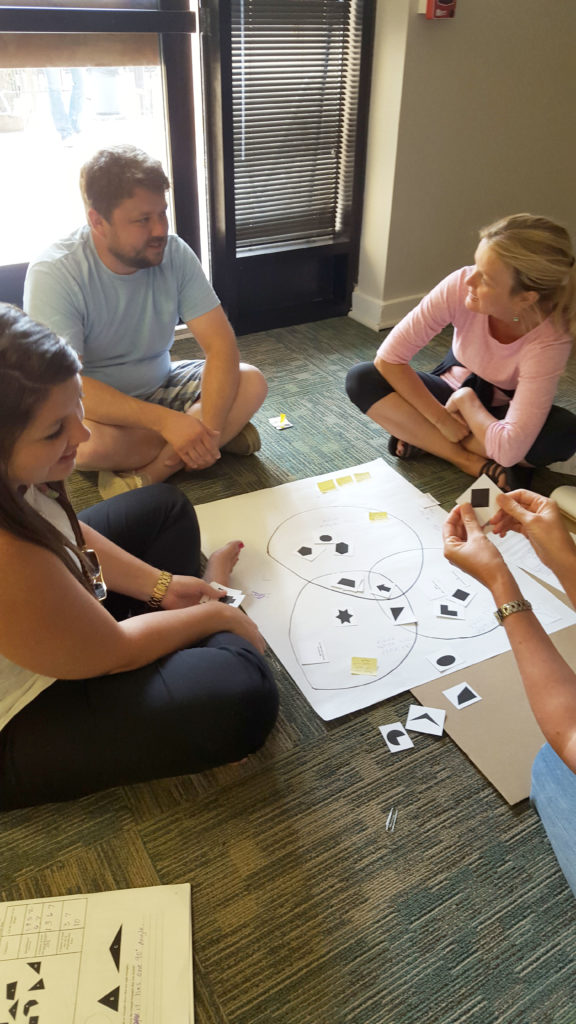
Kellie Childress, from left, James Hay and Julie Reid engage in the card sort of the 4th-grade geometry, two-dimensional shapes, angles and symmetry formative assessment lesson.
Photo by Monique Beckham
By Coty Horn
coty.horn@daviess.kyschools.us
Last June, a group of Kentucky teachers used their expertise to develop elementary formative assessment lessons for grades K-5. This project allowed teachers to grow in their understanding mathematics while producing resources for Kentucky educators to use. This was a week-long project that included mathematics consultants from KDE and K-5th-grade teachers from across Kentucky.

Coty Horn
When I arrived, I had little knowledge of what a formative assessment lesson (FAL) included and how I could use them in my classroom. The first day of our training focused on the components of a FAL and how students would work through the collaborative activities.
I learned quickly that a FAL consists of many parts and gives teachers a chance to facilitate higher order thinking in their classroom. The first component is for the students to complete the pre-assessment, the second is the whole class introduction to the concept, the third is the collaborative activities students complete together, the fourth is the extension activity if needed, the fifth is the whole class discussion, and finish with the post assessment. Students will have the pre-assessments as well to reflect on their growth.
When our first day of training was complete, we split into grade levels to focus on one standard and begin work on an original FAL.
When my team met, we first looked at our standards and the major work of our grade level. We discussed what we found to be difficult in our own classrooms and decided on creating a FAL that focused on multiplication using the distributive property. Multiplication and division is a major work of 3rd grade and distributive property is a concept that we felt needed reinforcement.
After our decision on a standard, we discussed how we taught this concept in our classroom and what the Kentucky Academic Standards focused on with this skill. From that point, we moved into creating each component of the FAL. While collaborating with other 3rd-grade teachers, the math specialists were available to guide us in implementing the mathematical practices into the FAL. Their expertise was crucial in addressing the Kentucky Academic Standards and helping us create a FAL that fostered a deep understanding of mathematics in our students.
This school year, my students completed the distributive property FAL and loved it. This took some setting up by me and introducing the process to students, but after that, the students picked up quickly on the collaborative activities. I was the facilitator during this FAL, and it was amazing to see my students learning so much through their peer interactions and conversations.
I would highly recommend teachers using the grade level content FALs that are available on the Kentucky Department of Education’s website. Teachers involved in the work of this task force gained a lot of insight into math instruction and the Kentucky Academic Standards.
Coty Horn has a dual certification in elementary education and special education. She teaches 3rd grade at East View Elementary School (Daviess County). This school year is her fifth year teaching.

Monique Beckham
By Monique Beckham
monique.beckham@fayette.kyschools.us
In June 2015, the Kentucky Department of Education hosted 11 teacher leaders from across the state to participate in a Formative Assessment Lesson Development Task Group at Barren River State Park.
The group’s charge was to develop formative assessment lessons (FALs) for all elementary grades to be deployed during the 2015-16 school year. The purpose of formative assessment lessons is to provide teachers and students a tool to gauge and guide student understanding of math concepts presented in a particular unit.
The collaboration in this setting was immense. Not only did members of small groups share their ideas and expertise among each other, we also convened for sharing sessions with the entire task force. The dialogue that was shared, along with the expertise of my colleagues, supersedes all of my previous opportunities for professional learning. Working with teachers from diverse backgrounds and experiences yielded a unique collaboration.
Countless hours were spent analyzing the Kentucky Academic Standards and researching teacher resources and data.
James Hay of Rowan County and I developed an assessment task for 4th-grade geometry. Our assessment task began with an analysis of the Kentucky Academic Standards for Mathematics specific to geometry in all grade levels. Our approach was to identify misconceptions that students often demonstrate and to view sample materials available that would aid teachers in their deployment of this FAL. We examined tasks for 4th grade, but also explored researched practices for 5th.
The task we agreed on was creating a shape sorter. The shape sorter approach may seem quite trivial in nature, but a greater degree of difficulty can be created when you when introduce irregular shapes. We also debated whether to include shapes that share more than one attribute. We concluded that we must incorporate a Venn diagram to demonstrate the relationship among varying shapes.
Our aspirations yielded an assessment that could appeal to students through multiple intelligences, but also offer varying degrees of difficulty.
While this FAL was designed to be piloted with 4th-graders, I tested it on my 5th-grade students. My students generally have had a lot of experience with regular polygons, yet they often have limited exposure to polygons that fall outside this realm and are concave. I used this FAL as a pre-assessment for foundational understandings of two and three-dimensional figures.
Formative assessment lessons force dialogue among students. Because students are working in a small group with peers, they engage in exploration of trial and error, posing and testing their theory on their peers. Students have informal debates with peers in a way that feels safe; they’re not stressing about the wrong answer. They offer support, strong affirmation and rationale for their answers. We’re still working on getting our words on paper, but the verbal discussions are well worth their waiting goal.
Special thanks to all those who presented, prepared and planned such a wonderful professional development opportunity. I greatly enjoyed forming new relationships with colleagues and the depth of our investigation with the Kentucky Academic Standards.
Monique Beckham, a graduate of the University of Kentucky with degrees in elementary education, instructional systems design and education leadership studies, is an 8th-grade math teacher at Bryan Station Middle School (Fayette County). As a teacher leader, Beckham serves on various committees, including Middle School Math Design Cohort, Substitute Teacher Trainer, New Teacher Induction Program and team lead at her school. She also serves on the statewide Teachers Advisory Council.




Leave A Comment